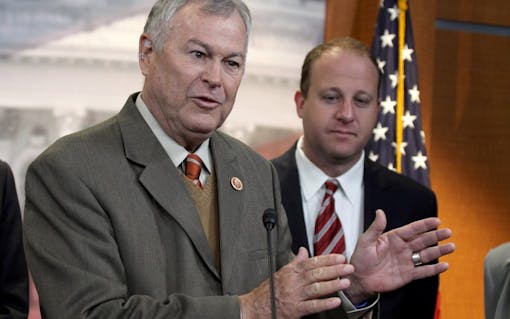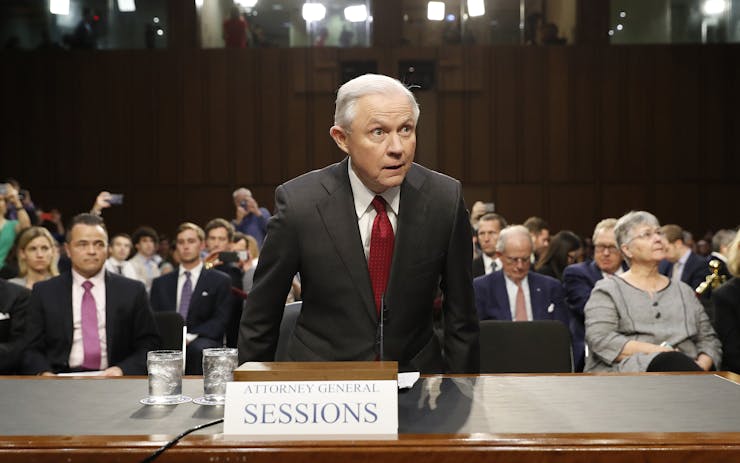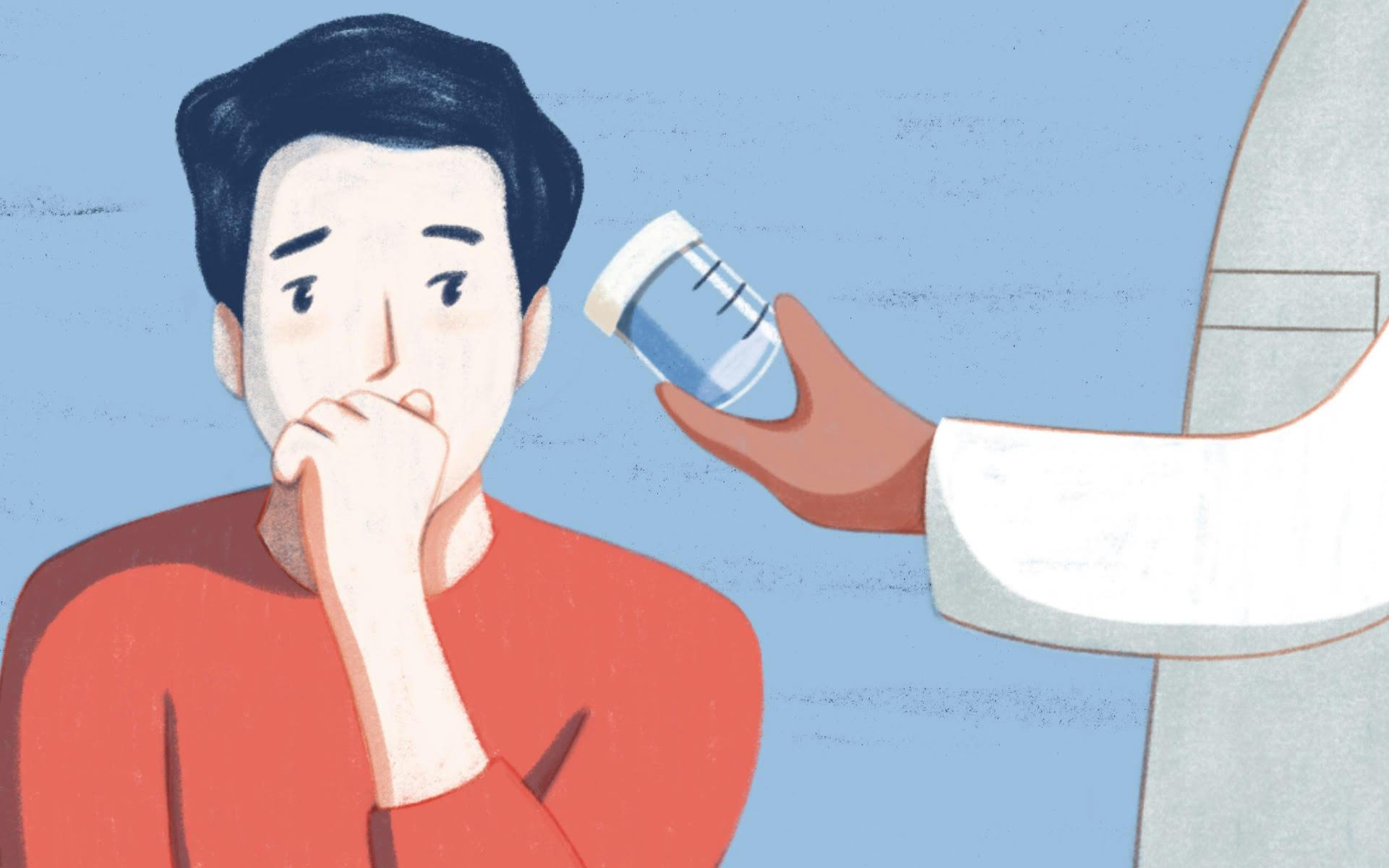Editor’s note: This is the second installment in a new weekly politics-and-culture column, ‘The Haymaker,’ by Leafly Deputy Editor Bruce Barcott.
In his testimony before the Senate Intelligence Committee on Tuesday, Attorney General Jeff Sessions came on like an elfin Liam Neeson:
“Just last week, it was reported that overdose deaths in this country are rising faster than ever recorded. The murder rate is up over 10 percent—the largest increase since 1968. Together, we are telling the gangs, the cartels, the fraudsters, and the terrorists: We are coming after you.”
Trump and Sessions: They will look for you, they will find you, and they will…well, they can’t legally go full Liam and kill you with a car door. But the threat of arrest and prosecution is real.
On its face, Sessions’ vow is right and good. Yes! Go after the gangs, the cartels, the fraudsters and the terrorists. That’s what the Department of Justice should do.
The problem comes when you realize that in the mind of Jeff Sessions, the millions of American patients who rely on medical marijuana fall under the attorney general’s broad definition of “criminal.” And he wants to come after them. By which I mean, he wants to come after us.
No Ambiguity at the Justice Dept.
President Trump’s thoughts on medical marijuana are about as nebulous as a covfefe, but at the Justice Department the policy set by Sessions seems clear. Cannabis is illegal, period.
A couple hours before the Sessions testified before the Senate Intelligence committee on Tuesday, in fact, his second-in-command, Deputy Attorney General Rod Rosenstein, drew a bright line during his own testimony before the Senate Appropriations committee.
Rosenstein told the committee that “from a legal and scientific perspective, marijuana is an unlawful drug. It’s properly scheduled under Schedule I.” (Of course, if we looked at it from a scientific perspective marijuana wouldn’t be scheduled at all. But that’s a column for another day.) Rosenstein vowed to enforce federal law, which holds that cannabis is illegal. “[That] is the federal policy with regards to marijuana.” Any questions?
‘Use All Laws Available’
Today’s double-whammy testimony came about 24 hours after the publication of a letter Sessions wrote to Congressional leaders last month, asking them to allow the Justice Department to arrest and prosecute patients in states where medical cannabis is legal.
Medical marijuana is part of the solution to America's opioid death spiral, not its cause.
Since late 2014, federal prosecutors have been prohibited from doing so because of the Rohrabacher-Farr (now Rohrabacher-Blumenauer) amendment, which Congress re-authorizes every year. It’s not a change in criminal law, it’s a budgetary restriction: The DoJ may not use any of its budget to pursue medical marijuana cases.
“I believe it would be unwise for Congress to restrict the discretion of the Department to fund particular prosecutions, particularly in the midst of an historic drug epidemic and potentially long-term uptick in violent crime,” Sessions wrote. “The Department must be in a position to use all laws available to combat the transnational drug organizations and dangerous drug traffickers who threaten American lives.”
Those two sentences contain a critical—and deadly—conflation. We are indeed in the midst of a historic drug epidemic…of opioid abuse. Every month, more research points to the conclusion that legalizing medical marijuana lowers opioid abuse and overdose death rates. Medical marijuana is part of the solution to America’s opioid death spiral, not its cause.
Combat Opioids, Not Cannabis
Around 60,000 Americans died from drug overdose last year. Zero died from marijuana use. And yet Sessions clings to the fantasy that re-criminalizing medical marijuana will stop our friends, neighbors, and co-workers from killing themselves with fentanyl. 93 percent of Americans believe medical marijuana should be legal. Sessions remains among the the 7 percenters, the last hardened holdouts.
Sessions remains among the 7 percenters, the last hardened holdouts.
Why? Because to Sessions, drugs are drugs. They’re all bad. And crime is crime. Are medical cannabis providers gangsters or criminal masterminds? Of course not. Look at who the Justice Department prosecuted for medical marijuana in the years before Rohrabacher-Farr: Steve DeAngelo, the founder of Oakland’s Harborside Health Center, and Lynette Shaw, founder of the Marin Alliance for Medical Marijuana, the first licensed medical marijuana dispensary in the United States. These are not terrorists or dangerous drug traffickers. They are neighbors who run successful health stores.
Though it took years, both eventually beat the feds. Harborside Health is thriving. DeAngelo is now a bestselling author, Fortune magazinecover subject, and revered cannabis entrepreneur. After being shut down for years, Shaw announced this week that she’s re-opening the Marin Alliance on June 15.
Who to Arrest First?
Who will Sessions be “coming after” if Congress kills Rohrabacher-Blumenauer, which is up for re-authorization in September? Seriously. Who would federal prosecutors attempt to send to prison? I can think of a few top-level candidates:
Perry Parks, the decorated Vietnam war veteran and church usher who manages his PTSD with medical cannabis in his home state of North Carolina, where it is illegal.
Parks would be happy to take the stand and talk about the tens of thousands of fellow veterans who’ve used medical marijuana to wean themselves off their soul-killing VA-prescribed opioid cocktails. He’ll tell you about the states that have accepted PTSD as a qualifying MMJ condition, and go into detail about the promising research being done on cannabinoids, memory, and sleep. He’ll introduce as evidence his copy of TIME magazine’s special issue, “Marijuana Goes Main Street,” signed by President Trump himself. (Perry’s there on page 31.)
Carey S. Clark, the Maine nurse who worked to pass adult-use legalization in her home state last fall. I don’t know if Clarke is an MMJ patient or works with them. I do know that she’s the president of the American Cannabis Nurses Association, which makes her an excellent symbolic target for prosecution.
Maybe federal prosecutors should go after her and her fellow nurses, who have known since the 1970s that cannabis can offer real relief to cancer patients suffering from pain and nausea.
Bruno Stillo, the 5-year-old Miami boy who uses cannabis oil—with THC—to control his intractable seizures.
If the feds are uncomfortable with the optics of kindergarten prosecution, they could go after Bruno’s mother, Jacel Delgadillo, the co-founder of the brave parent group CannaMoms.
Allen Peake, the conservative Republican lawmaker who provides cannabis oil to Georgia parents who can’t otherwise obtain it.
Peake has fought for, and passed, Georgia’s landmark cannabis oil laws, so the feds could probably get him on a three-fer: Cannabis possession, distribution, and conspiracy to aid and abet same.
Lori Ajax, head of California’s Bureau of Medical Cannabis Regulation.
If we’re talking about drug gangs and organized crime, how about this: Ajax aids and abets the distribution of medical marijuana as part of an organization—the State of California—that employs about 235,000 people. That’s one hell of a cartel.
Rep. Dana Rohrabacher, co-author of the Rohrabacher-Blumenauer amendment. Why not go directly to the source?

Rep. Dana Rohrabacher, R-Calif., left, accompanied by Rep. Jared Polis, D-Colo.(AP Photo/Lauren Victoria Burke)
Rohrabacher, a staunch Trump supporter and deep-red conservative, is one of cannabis legalization’s greatest advocates. He’s also spoken publicly of his use of medical marijuana in our nation’s capital, which he took because it gave him relief from arthritis pain. Personally, I’m hoping for this one. Sessions v. Rohrabacher would surely make an epic court drama.
I’m sure Jeff Sessions doesn’t think these are the characters running America’s medical marijuana “cartel.” In his mind there may be freaky-haired hippies or swarthy ne’er-do-wells out of a 1950s bijou double-feature. But in reality there is no medical marijuana cartel. The people pictured above are the regular folks who care for patients or use medical marijuana in responsible ways to stop seizures, relieve pain, or sleep at night. They are old and young, conservative and liberal. If Jeff Sessions met some of them, and listened, he might change his mind. He might direct his department to focus on actual violent gangs, cartels, and terrorists. And allow the American people to find relief in a safe, effective, accepted and increasingly legal medicine.














